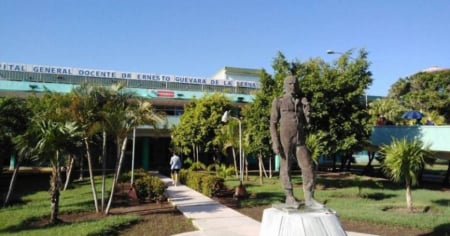The national director of Epidemiology at the Ministry of Public Health of Cuba (MINSAP), Dr. Francisco Durán García, denied on Wednesday the rumors regarding the emergence of a new variant of COVID-19 on the island and clarified that, to date, no new strain has been detected circulating in the country.
During his speech on the Cuban Television Information System, Durán acknowledged that information has been circulating on social media and among the population regarding a supposed new variant of the coronavirus in Cuba, which he categorically denied.
"It's a new variant that isn't new," he said, referring to the Omicron subvariants XBB.1.5 and XBB.1.16, identified since 2023 in countries like the United States, the United Kingdom, several African nations, and Southeast Asia.
The epidemiologist explained that these subvariants, although more contagious, have not shown to be more virulent or to cause more severe clinical cases than previous strains.
"It has not had a significant impact in terms of mortality," she clarified.
According to Durán, the most common symptoms associated with these subvariants are fever, general malaise, and conjunctivitis. He also emphasized that Cuban vaccines, such as Soberana and Abdala, remain effective against these strains.
"The vaccines that are administered around the world, including ours, are effective against all these variants. It has not been demonstrated that they are ineffective," he stated.
He also referred to the misconception that many people have about the disappearance of the virus: “Throughout these years, it sometimes seems to us Cubans that COVID has disappeared, but the Omicron variant with its different subvariants has been circulating.”
Durán explained that one of the factors that has contributed to the virus's persistence globally is that many people have not been vaccinated, particularly in countries where anti-vaccine movements are prevalent.
"This allows the virus to continue circulating," he explained, adding, "In Cuba and countries with high vaccination coverage, the risk is much lower."
The specialist urged the population to maintain their vaccination regimen with annual boosters, especially for those over 65 years old, healthcare workers, and other vulnerable groups.
"Every year we have to get a booster," he emphasized. He also noted that in Cuba, children receive their COVID vaccines starting at the age of two, which has contributed to maintaining high levels of immunization.
Durán also warned about the risks of traveling to countries with high circulation of the virus, recommending the continued use of a nose and mouth covering (mask), especially in crowded places or if respiratory symptoms are present.
In conclusion, he urged citizens to take responsibility and to respect others' health, emphasizing that the use of masks remains essential in enclosed spaces and at any sign of illness.
"The use of masks is still very necessary, especially when we feel unwell, have a cold, or are experiencing a slight fever, to also protect our fellow citizens," he concluded.
Although Cuban health authorities assure that no new variants of COVID-19 have been detected, the population remains under siege from other infectious diseases that seriously impact public health.
Dengue has particularly overwhelmed hospitals in several provinces, with thousands of patients admitted and a medical infrastructure at its limit. In February alone, it was estimated that over 2,500 people remained hospitalized due to this issue, especially in eastern areas like Santiago de Cuba and Las Tunas.
Last November, the Ministry of Public Health warned that the transmission of dengue and Oropouche virus remained active in at least ten territories across the country.
Although a slight decrease in cases was reported, the hygienic and sanitary conditions and the lack of resources hindered effective control. Both viruses exhibit similar initial symptoms, making early diagnosis challenging, and dengue, in particular, can progress to hemorrhagic forms with a risk of death.
Recently, a young man in Las Tunas was in critical condition after developing complications from hemorrhagic dengue, in a case that highlighted the deficiencies of the hospital system in the eastern part of the country. The lack of beds in intensive care units, along with the shortage of medications, continues to worsen the epidemiological situation.
Frequently Asked Questions about COVID-19 and the Epidemiological Situation in Cuba
Is there a new variant of COVID-19 in Cuba?
No, no new variant of COVID-19 has been detected in Cuba. Dr. Francisco Durán García, national director of Epidemiology at MINSAP, dispelled rumors about a new variant and clarified that the subvariants of Omicron XBB.1.5 and XBB.1.16, while more contagious, are not more virulent nor do they cause more severe clinical presentations than previous strains.
Are the Cuban vaccines effective against the new subvariants of COVID-19?
Cuban vaccines, such as Soberana and Abdala, remain effective against the Omicron subvariants. Dr. Durán stated that these vaccines, just like those administered worldwide, are effective against the new subvariants XBB.1.5 and XBB.1.16.
What preventive measures are recommended to avoid the spread of COVID-19 in Cuba?
It is recommended to continue using the nasal mask (facemask) in enclosed spaces and when experiencing respiratory symptoms. Additionally, it is important to keep up with the vaccination schedule and to receive annual boosters, especially for vulnerable groups such as those over 65 years old and healthcare workers.
What is the current situation of dengue and the Oropouche virus in Cuba?
Dengue remains present in three provinces and the Oropouche virus in seven provinces of Cuba. Although transmission has decreased, these viruses continue to pose a significant public health risk due to resource shortages and structural deficiencies in waste collection and sanitation.
Filed under:
